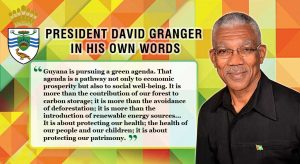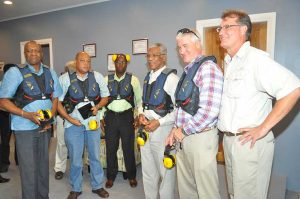 WITH the major oil find in Guyana’s Exclusive Economic Zone (EEZ), the country is poised at the brink of a development bonanza, but if this is to be realised a strong legislative and regulatory framework, buttressed by effective oversight and adequate enforcement mechanisms, is critical. With oil and gas production expected to begin in 2020, policy-makers and other stakeholders are scrambling to learn quickly, in order to learn from lessons from the mistakes made in other jurisdictions, which had found themselves in similar positions.
WITH the major oil find in Guyana’s Exclusive Economic Zone (EEZ), the country is poised at the brink of a development bonanza, but if this is to be realised a strong legislative and regulatory framework, buttressed by effective oversight and adequate enforcement mechanisms, is critical. With oil and gas production expected to begin in 2020, policy-makers and other stakeholders are scrambling to learn quickly, in order to learn from lessons from the mistakes made in other jurisdictions, which had found themselves in similar positions.
The Government of Guyana, which was elected on the back of an anti-corruption agenda and has advanced that agenda since taking office, has committed to an open and transparent approach to governance and development of this industry. With assistance from the Commonwealth’s legal department, examination of models from Norway, Africa, Trinidad and Tobago and other parts of the world, Government is creating a unique model to efficiently manage the sector.
President David Granger, during a meeting in March 2017 with executives of international Oil Company ExxonMobil, reaffirmed his Government’s commitment to development of the oilandgas sector that allows the parliamentary Opposition and the people of Guyana to be involved in the process.
“We are committed to the norm of transparency… so that we can move forward at a domestic level, not only in an atmosphere of transparency, but trust as well, so that all Guyana would see this not as a short-term bonanza; so that Guyanese will see this as a national industry… In this regard, we are walking step by step as the developments take place offshore and the developments in terms of our legislation within our regulatory framework in terms of the passage of information to various stakeholders in Guyana and the diaspora, so that we can create an environment which is stable and secure,” the President said.
Legislative framework and support mechanisms
 Minister of Natural Resources, Raphael Trotman, explained that petroleum is a completely different form of mining. Therefore, Government has seen it fit to move in tandem with the rest of the world, and have it managed under a separate regulatory agency. The establishment of a new regulatory agency is catered for in the Petroleum Commission Bill and will see the responsibility taken from the Guyana Geology and Mines Commission (GGMC).
Minister of Natural Resources, Raphael Trotman, explained that petroleum is a completely different form of mining. Therefore, Government has seen it fit to move in tandem with the rest of the world, and have it managed under a separate regulatory agency. The establishment of a new regulatory agency is catered for in the Petroleum Commission Bill and will see the responsibility taken from the Guyana Geology and Mines Commission (GGMC).
Minister Trotman said, “It is really the fulfilment of a desire and an objective to strengthen regulation, currently oil is regulated under the GGMC, the Guyana Geology and Mines Commission, but it is most known for the mining of gold and bauxite and so it was felt that we needed something by itself, given that you have a Forestry Commission, a Wildlife Commission, you should have a Petroleum Commission.”
The bill, which is a very critical part of Government’s preparatory efforts, was first laid in the National Assembly in May 2017 and gave title to an Act to provide for the establishment and functions of the Petroleum Commission of Guyana and for related matters. The six- part bill has 51 sections, which cover areas pertaining to the establishment and incorporation of the Petroleum Commission, functions and duties of the Commission and financing.
Minister Trotman reiterated that while the 1997 Amended Petroleum Exploration and Production Act gave significant powers to the minister, Government sought to diffuse some of those powers to the commission. The commission will be semi-autonomous and is similar in construct to agencies such as the Guyana Forestry Commission (GFC) and the Guyana Geology and Mines Commission (GGMC) and will also have a reserve fund. It was composed with inputs from the Commonwealth Secretariat’s Oceans and Natural Resources Advisory Division and meets international best practices and standards, Minister Trotman assured.
 “We have petroleum regulations, which are also under review and the work is completed in so far as our drafts are concerned with the Commonwealth Secretariat and we will take those again for consultations with stakeholders, with the Opposition and even with persons in and out of Guyana, law firms, agencies, etc.,” he noted.
“We have petroleum regulations, which are also under review and the work is completed in so far as our drafts are concerned with the Commonwealth Secretariat and we will take those again for consultations with stakeholders, with the Opposition and even with persons in and out of Guyana, law firms, agencies, etc.,” he noted.
Other regulative policies, critical to the development of the sector, include the oil-andgas policy, the Revised Petroleum Act and Regulations, Local Content Policy and Regulations, the Petroleum Commission Bill and the Petroleum Taxation and Fiscal Legislation.
Recently, the Government of Guyana, through the Ministry of Natural Resources signed a Memorandum of Understanding (MOU) with the Petroleum Institute of Mexico, which is recognised around the world as one of the best of its kind in developing technical solutions, conducting basic and applied research and providing specialised training in the oil-and-gas sector. Guyana, as a new entrant in the oil-and-gas industry, stand to benefit from Mexico’s expertise and experiences, which is expected to foster overall development in Guyana.
The IMP, in turn, stands to benefit by creating technical confidence to eventually provide some services to Guyana. The MOUs provide for the creation of three white papers, training of human resources in labour, technical and professional jobs and the creation of a technical background and overall technical framework for Guyana. The white papers aim to build an overall balance of demand and supply of oil and gas in the local industry.
 Guyana is also the beneficiary of a mentoring exchange programme with Uganda, facilitated by the Chatham House’s New Petroleum Producers Group and Minister Trotman said the line-up of agencies providing support to Guyana in its Oil-and-gas Journey is impressive.
Guyana is also the beneficiary of a mentoring exchange programme with Uganda, facilitated by the Chatham House’s New Petroleum Producers Group and Minister Trotman said the line-up of agencies providing support to Guyana in its Oil-and-gas Journey is impressive.
A five-member team also represented Guyana at the first Global Workshop on Oil Spill Response Planning in August, 2016 hosted by the Energy Governance and Capacity Initiative (EGCI), which is a U.S. Department of Sate-led interagency effort that provides a range of technical and capacity building assistance to the governments of select countries to help them establish the capacity to manage their oil- andgas sector resources responsibly. As a recipient of the initiative, Guyana was given the opportunity to tap into the U.S. Government’s considerable expertise and capabilities in oil-spill response planning in order to provide assistance that is tailored to the country’s specific needs.
Minister Trotman informed that “We have developed legislation for health and safety matters. We have developed legislation for what is known as local content ensuring that Guyanese businesses and persons are engaged for the provision of services and goods. In so far as the Draft Upstream Oil and Gas Policy, the Commonwealth Secretariat has completed that, we are finalising a review of and will share soon. So the point here is that we have been receiving the world’s best advice.”
The Sovereign Wealth Fund
There is an Act for the setting up of the Sovereign Wealth Fund (SWF), which the minister said was completed in January 2017 and passed to the Minister of Finance, Mr. Winston Jordan, who has since had it reviewed by several other agencies such as the World Bank, the International Monetary Fund (IMF), and the Inter-American Development Bank (IDB). The Natural Resources Minister is optimistic that before the end of 2017, the draft legislation would be completed and subjected to public scrutiny and comment. It was pointed out by the minister that “a Bill is just a draft. It shows the Government’s intent and we want to have the bill made better by having more members of the public comment on it and make suggestions, which would be in the best interest of all of us.”
 A Sovereign Wealth Fund is defined as a state-owned investment fund that comprises surpluses from official foreign currency operations, proceeds of privatisations, governmental transfer payments, fiscal surpluses and/or receipts resulting from resource exports. These monies can be used for investment purposes to benefit the country’s economy and citizens. Guyana’s Sovereign Wealth Fund Bill was drafted in collaboration of the Commonwealth Secretariat. Government sought to fashion a Bill, which holds fast to the Santiago Principles but at the same time, reflected the unique Guyanese context. The Santiago Principles are a set of generally accepted principles and practices that reflect Sovereign Wealth Funds’ investment practices and objectives.
A Sovereign Wealth Fund is defined as a state-owned investment fund that comprises surpluses from official foreign currency operations, proceeds of privatisations, governmental transfer payments, fiscal surpluses and/or receipts resulting from resource exports. These monies can be used for investment purposes to benefit the country’s economy and citizens. Guyana’s Sovereign Wealth Fund Bill was drafted in collaboration of the Commonwealth Secretariat. Government sought to fashion a Bill, which holds fast to the Santiago Principles but at the same time, reflected the unique Guyanese context. The Santiago Principles are a set of generally accepted principles and practices that reflect Sovereign Wealth Funds’ investment practices and objectives.
President Granger, speaking to the diaspora in London, said that his Government will ensure that the revenues generated by Oil and Gas industry would be put into the SWF to improve the livelihood of Guyanese. “Oil and gas holds prospects, no doubt people would want to capitalise on that bonanza, it is a huge find and you and your grandchildren could be assured that the country of your birth would put that money into a Sovereign Wealth Fund, so we would never be poor again,” the Head of State assured.
Meanwhile, Minister Trotman, explaining Government’s vision for the SWF said, “We want to ensure that a percentage of everything that we earn now is available to Guyanese two and three hundred years from now. So some aspect of it is going to be saved.” However, that is not all. Minister Trotman explained further that another aspect would be utilised for budget support. He noted that “if for example your budget of $80 billion and there is a severe drought and rice is insufficient to bring in foreign currency, or gold, you may tap into that fund.”
Additionally, the minister said the fund will be important to ensuring Government can embark on transformative infrastructural development projects. Additionally, he said, “In many countries, particularly, developing countries, the fund is used to aid social programmes, nutrition for children, care for the elderly, education, ensuring the best schools, the best aids, the best teachers, medical facilities are in place and we have the best roads.”
Harnessing Natural Gas
A desk study to determine the options, cost, economics, impact, and key considerations for transporting and utilising natural gas from offshore Guyana for electricity generation has been commissioned by the Government.
In April 2017, consultancy firm, Energy Narrative, began the eight-week study to verify natural gas supply and demand projections, analyse the technical feasibility of the proposed natural gas pipeline, compare the proposed natural gas pipeline with other transportation media, analyse the technical feasibility of existing power generation equipment, integrating new gasfired electricity generation equipment, analyse the cost to deliver natural gas and the estimated impact on electricity prices.
The study’s estimated cost is US$70,000. ExxonMobil officials have estimated that 30 million cubic feet of gas per day can be collected, which is sufficient to power a 200-megawatt power plant, which Mr. Trotman said would be much more than is required, but the challenge remains bringing it to shore, since it is 123 miles offshore. It is also estimated that one of the off-shore fields, known as Liza, could contain as much as 1.4 billion barrels of oil mixed with natural gas. Affordability to bring the gas to shore is also another factor being considered by the Government of Guyana.
 Minister Trotman said Government is in receipt of a report on the feasibility of the venture, which Minister of Public Infrastructure Mr. David Patterson is studying and analyzing before a definitive position is taken. The process would be conducted in an environmentally safe manner in keeping with the Government’s ‘green’ state trajectory. “We are not going to burn this gas out. Ten or 20 years ago, the conventional wisdom was, you flared it [burning off the gas at the well], but now we recognise that not only is it damaging environmentally, but of course that Guyana has committed to environmental preservation and protection, so the notion of us burning or lighting this gas because it is of no use to us, is out, “Minister Trotman said.
Minister Trotman said Government is in receipt of a report on the feasibility of the venture, which Minister of Public Infrastructure Mr. David Patterson is studying and analyzing before a definitive position is taken. The process would be conducted in an environmentally safe manner in keeping with the Government’s ‘green’ state trajectory. “We are not going to burn this gas out. Ten or 20 years ago, the conventional wisdom was, you flared it [burning off the gas at the well], but now we recognise that not only is it damaging environmentally, but of course that Guyana has committed to environmental preservation and protection, so the notion of us burning or lighting this gas because it is of no use to us, is out, “Minister Trotman said.
He noted further that “at the same time, even though we are storing gas we have to ensure that we do not take ourselves away from our commitment to go green by using renewable energy, gas is being looked at as a transitional resource that will be there as we bring ourselves into renewable, water and solar and maybe even wind and as a stand-by in case a dam goes down or repairs or a drought, we should have something else.”
President Granger, during a meeting on May 10, 2017 with Mr. John Hess, Chief Executive Officer (CEO) of HESS Corporation, which holds a 30 percent interest in ExxonMobil’s offshore drilling operations in the Stabroek Block, also said that while the country is eager to have oil production come on stream, this must be done in the context on Guyana’s ‘green’ development trajectory and as such, protection of the environment is critical. “We are very concerned about the preservation of the environment… We want the extractive industries to be developed in a sustainable way,” he said.
The Government of Guyana, through the Ministry of Natural Resources, has assured that it will continue to work with ExxonMobil and its partners in the exploration and development of resources in the Stabroek Block, even as it continues to engage and update citizens and stakeholders about the preparations for petroleum production and other related activities.




.png)









